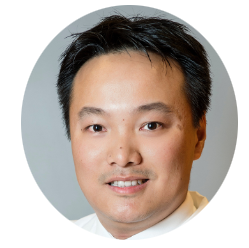VIRTUAL EVENT
ArcherDX Virtual Roadshow
December 1, 2020, 2:00 pm SST
Register Now!
AGENDA
Detecting challenging genetic biomarkers in APAC
by Dr. Richie Soong
ABSTRACT
With technological advancement, numerous breakthroughs have been made on increasing the detection rate of key genetic biomarkers although some genetic biomarkers remain challenging to detect. Dr. Richie Soong will give a review and share his insights on the technologies available for genetic biomarker detection. Dr. Soong will also touch on why it is challenging to detect certain genetic biomarkers such as NTRK, CEBPA and FLT3-ITD.
Featured Webinar: A Clinician's Perspective of Institution-based Prospective
Molecular Profiling of Advanced Solid Tumours in Hong Kong
by Dr. Herbert H. Loong
ABSTRACT
Background:
Molecular profiling of tumour tissue to guide treatment of patients (pts) with advanced solid tumours has previously been reported. Most series were reported from large volume academic cancer centres in the West. There is a paucity of data reporting the experience and applicability of such an approach in Asia. We report our single-centre experience of conducting a prospective molecular profiling programme for pts in advanced solid tumours.
Methods:
Pts with advanced solid tumours aged >/= 18 years, good performance status and archival tumour tissue available were prospectively consented. The RNA extracted from the FFPE tissue sections were subjected to RNA-sequencing using Archer FusionPlex Solid Tumor Kit and Archer Analysis Software 5.1. The putative gene translocations or alternative splicing were further confirmed with RT-PCR or FISH.
Results:
253 pts consented between Feb 2017 and Feb 2019. Demographics: M:F 138 : 115; Median age = 58 (range: 19-89). Diseases included sarcomas (n=88, 35%), NSCLC (n=61, 24%), glioma (n=42, 17%), melanoma (n=7, 3%) and others (n=55, 21%). Median turn-around time from consent to availability of report: 24 days (range: 3-112 days). 89% of samples passed quality control assessments. 8% (n=21) of samples could not be processed due to insufficient material (n=18), decalcified specimen (n=2) and poor RNA quality (n=1). 20 pts (9% of tested samples) had actionable genomic alterations. These include EGFRvIII mutations (n=7) and MET alterations (n=2) in gliomas; ROS1 (n=4), ALK (n=2), MET exon 14-skipping (n=1) and RET (n=1) rearrangements in NSCLC; ALK rearranged sarcoma (n=1). Across all diseases, 3 pts with NTRK fusions were identified.
Conclusions:
We report the first institutional-based molecular profiling programme in Hong Kong in an effort to improve access to precision oncology. Such programmes are feasible in Asia. Pts can potentially benefit from identification of actionable alterations within a reasonable time frame.
For Research Use Only. Not for use in diagnostics procedures.
Live Q & A to follow
Register Now!
FEATURED PRESENTERS

Dr. Richie Soong, BSc (Hons), Ph.D., FRCPath
Founder and Managing Director, Pascific Laboratories
ABOUT THE PRESENTER
Born in Darwin, Australia, Richie Soong graduated from the Department of Surgery at The University of Western Australia in 1998 with a PhD thesis on the clinical relevance of p53 alterations. He spent one year studying p53 alterations in Asian tumours at Tan Tock Seng Hospital in Singapore before moving to Roche Diagnostics in Penzberg, Germany. At Roche, he was involved in developing systems and applications for the LightCycler (real-time PCR) instrument, including technology for efficient multiplex PCR and reliable low-level molecule detection. Richie joined the faculty at the University of Alabama at Birmingham in 2001 and expanded his research to pharmacogenetics, fluoropyrimidines and epigenetics under Robert Diasio (now Director of the Cancer Centre, Mayo Clinic). Returning to Asia in 2004, Richie founded the Centre for Translational Research and Diagnostics (CTRAD) and became a tenured Associate Professor over 13 years at the National University of Singapore.
Recently, Richie has started up Pascific Laboratories, as a vehicle to improve access to the benefits of precision healthcare throughout Asia. He has published 160 articles and patents with 6000 citations, been awarded US$20 million in academic and industry grants as PI, and is invited to give talks world-wide on molecular diagnostics (especially medical genomics, liquid biopsies, digital pathology), and precision healthcare.

Dr. Herbert H. Loong
Clinical Assistant Professor, Department of Clinical Oncology
Deputy Medical Director, Phase 1 Clinical Trials Centre, The Chinese University of Hong Kong
ABOUT THE PRESENTER
Dr. Herbert H. Loong holds conjoint appointments of Clinical Assistant Professor in the Department of Clinical Oncology and Deputy Medical Director of the Phase 1 Clinical Trials Centre of The Chinese University of Hong Kong. He is also the current and founding convenor of the Prince of Wales Hospital Adult Sarcoma Multidisciplinary Team.
Dr. Loong obtained his medical degree with a Distinction in Surgery from The University of Hong Kong in 2003. He has completed a Fellowship in Drug Development at Princess Margaret Cancer Centre in Toronto, Canada with a special focus on Experimental Therapeutics. His clinical and research interests also include Sarcoma Medical Oncology, Thoracic Oncology and Health Economics.
Dr. Loong is a recipient of the European Cancer Congress Fellowship Grant (2013), the ASCO Annual Meeting Merit Award (2014), the Hong Kong College of Physicians Young Investigators’ Award (2014). Nominated by patients and their caregivers, Dr. Loong led the Lung Cancer Team at CUHK to be bestowed the IASLC Foundation Cancer Care Team Award in recognition for providing the best thoracic oncology care in “Asia & Rest of the World” in 2018.

Focus on what's important
ArcherDX NGS research panels are modular and scalable, enabling custom panel designs and new biomarker additions without sacrificing performance. Customization allows you to keep your panel up to date with the most recent NCCN guidelines, making your assay future-proof.
Get results quickly with minimal hands-on time. Low sample input and flexibility of sample type enables comprehensive tumor profiling even when sample is limited. One simple workflow for DNA, RNA and ctDNA.
